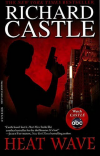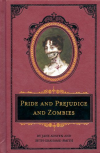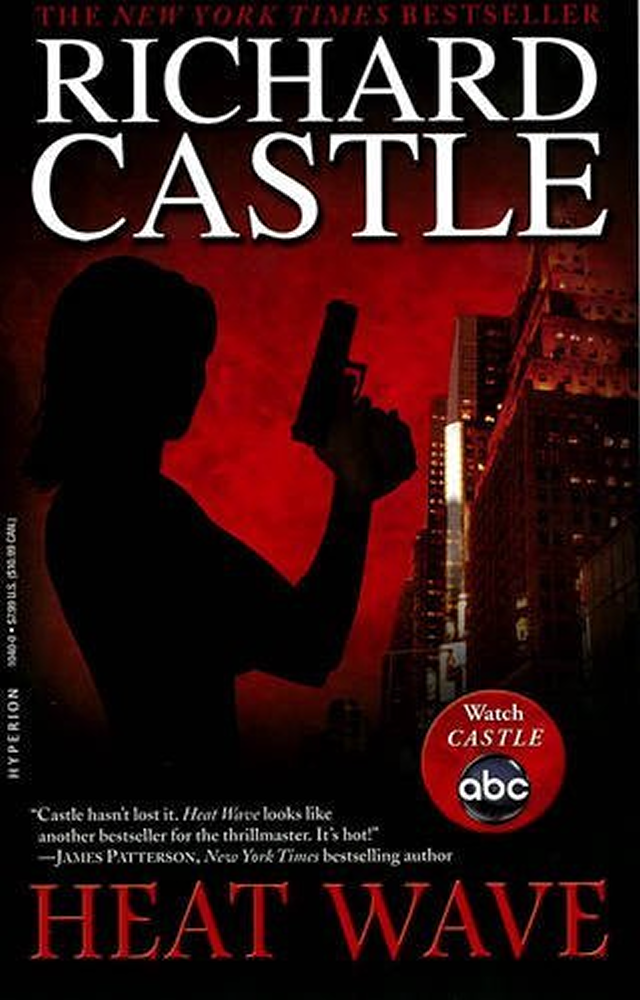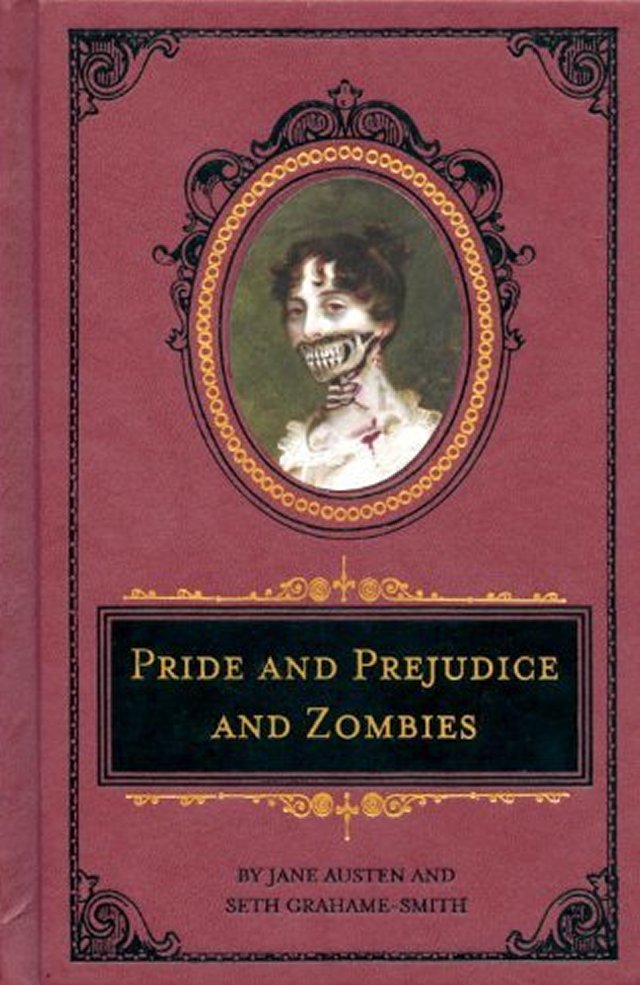 From the front flap:
From the front flap:
A New York real estate tycoon plunges to his death on a Manhattan sidewalk. A trophy wife with a past survives a narrow escape from a brazen attack. Mobsters and moguls with no shortage of reasons to kill trot out their alibis. And then, in the suffocating grip of a record heat wave, comes another shocking murder and a sharp turn in a tense journey into the dirty little secrets of the wealthy. Secrets that prove to be fatal. Secrets that lay hidden in the dark until one NYPD detective shines a light.
Continue reading “Heat Wave by Richard Castle: B”
Category: m
Pride and Prejudice and Zombies by Jane Austen and Seth Grahame-Smith: D-

From the back cover:
“It is a truth universally acknowledged that a zombie in possession of brains must be in want of more brains.”
So begins Pride and Prejudice and Zombies, an expanded edition of the beloved Jane Austen novel featuring all-new scenes of bone-crunching zombie mayhem. As our story opens, a mysterious plague has fallen upon the quiet English village of Meryton—and the dead are returning to life! Feisty heroine Elizabeth Bennet is determined to wipe out the zombie menace, but she’s soon distracted by the arrival of the haughty and arrogant Mr. Darcy.
What ensues is a delightful comedy of manners with plenty of civilized sparring between the two young lovers—and even more violent sparring on the blood-soaked battlefield. Can Elizabeth vanquish the spawn of Satan? And overcome the social prejudices of the class-conscious landed gentry? Complete with romance, heartbreak, swordfights, cannibalism, and thousands of rotting corpses, Pride and Prejudice and Zombies transforms a masterpiece of world literature into something you’d actually want to read.
Review:
The plot of Jane Austen’s Pride and Prejudice is generally well known. Elizabeth Bennet and Fitzwilliam Darcy meet, do not get along, form incomplete and incorrect notions of each other, see the error of their ways, and eventually end up living happily ever after. To this scenario, add some zombies, toilet humor, and a whole lot of innuendo and you have Pride and Prejudice and Zombies. Except that’s not entirely true, because somehow by adding more, Seth Grahame-Smith has robbed the original of nearly every bit of charm it possesses.
The version I read was the deluxe heirloom edition, which, in evident response to criticism about insufficient zombie presence, includes “new words, lines, paragraphs, and all-new scenes of ultraviolent mayhem throughout.” The black-and-white illustrations of the original edition have also been replaced by color paintings. Judging by what I’ve seen of the former, this is a vast improvement, even though Elizabeth looks to be wearing the same white gown throughout the entire novel. In the preface, Grahame-Smith describes how he came to be involved in the project (he was unfamiliar with the novel until the idea was suggested, and this definitely shows) as well as how he wrote it by obtaining an electronic copy of Austen’s novel and inserting his own text (appropriately colored red), vowing to change at least one thing on every page. Sometimes the changes are indeed just a word here or there, and sometimes entire excursions to a nearby village to fend off some “manky dreadfuls” are shoehorned in between two paragraphs. Not content to merely add text, Grahame-Smith seems to delight in removing it, as well. Among the casualties are many of the cleverest examples of Austen’s snark, especially those that reveal character, like when Austen writes of Mr. Bingley’s sisters that they “indulged their mirth for some time at the expense of their dear friend’s vulgar relations.”
To fit the story, the characters have changed as well. Some—like Jane and Mr. Collins—manage to emerge essentially unaltered, but the leads are very different. Elizabeth is bloodthirsty, quick to consider violence as a response to dishonor, and at one point yanks out the still-beating heart of a ninja she has just defeated and takes a bite. Ew! Darcy not only has zombie-fighting prowess, he’s now a lecherous git. He’s scandalously rude to Miss Bingley, whose transparent advances he fended off in the original with implacable politeness, and often makes lewd remarks, like, “On the contrary, I find that balls are much more enjoyable when they cease to remain private.” Again I say, “Ew!” I used to adore this couple and now I don’t like either of them! Other crass (and needless) adjustments find both Mr. Bennet and Mrs. Gardiner engaged in extramarital affairs, Mrs. Bennet afflicted with recurring bouts of nerve-induced vomiting, and Wickham grievously injured seemingly for no other purpose than to allow for repeated references to his newfound incontinence.
By and large, the zombie encounters are boring and pointless. In this regard, I think Grahame-Smith might actually have been better served by altering the story even further. If the undead menace had progressed to such an extent that our protagonists were forced to undertake a final climactic battle, for example, then their presence might’ve been leading up to something. As it is, the biggest effect the zombies have on the plot is in providing explanations for the sudden departure of Bingley’s party after the Netherfield ball and Charlotte Lucas’ acceptance of a marriage proposal from Mr. Collins. Grahame-Smith invents a number of “dear friends” of the Bennets to serve as zombie fodder, but these passages—like the Christmas visit from an entire zombified family—are so embarrassingly banal I truly hope nobody reading this book without foreknowledge of the original thinks Austen’s work contained anything similar.
To sum up: this is exceedingly awful. Grahame-Smith butchers the characters of Pride and Prejudice more effectively than a horde of zombies ever could. I would almost go so far as to say that I outright hated it, but every so often, an untouched bit of Austen would shine through the muck and make me smile for an instant. Now I’m going to try very hard to forget I ever read this.
More Information Than You Require by John Hodgman: B-
From the front flap:
When John Hodgman first embarked on his project to assemble, tabulate, and completely make up a comprehensive survey of COMPLETE WORLD KNOWLEDGE, he was but a former professional literary agent and occasional scribbler of fake trivia—in short, A NOBODY. But during an interview on The Daily Show with John Stewart, an incredible transformation occurred—he became A FAMOUS MINOR TELEVISION PERSONALITY. Hodgman realized from this unique vantage point that he understood better than ever that THERE IS SOME WORLD KNOWLEDGE YET TO BE DOCUMENTED. And so he has returned, crashing his Kansas farmhouse down upon the wicked witch of IGNORANCE to bring you MORE INFORMATION THAN YOU REQUIRE.
Review:
I’m aware that I have a rather particular sense of humor. And so it’s really not a surprise that I didn’t find More Information Than You Require to be all that funny. I’m more apt to giggle at a silly comment than I am to laugh at a lengthy essay full of clever falsehoods, of which this book is primarily comprised. That isn’t to say that the book is entirely lacking in funny lines—my favorite is “First, get a pig’s spleen. They are often just lying around.â€â€”but that they are few and far between.
Most of the material is at least somewhat amusing, eliciting a snerk here or there, but I don’t think I smiled even once while reading the absolutely ponderous chapter on mole-men near the end; references to Fraggle Rock couldn’t even endear it to me. I didn’t care for the recurring jokes about harm befalling cats, the occasional vulgarity, or the little page-a-day calendar blurbs that disrupted one’s flow of reading and which Hodgman himself seemed to acknowledge as annoying, saying, “You can’t avoid [reading them] forever.â€
However! There are also some very nice stories buried in here, those with a more personal feel that seem to be at least marginally grounded in reality. The chapter on being famous, for example, is terrific, and I loved reading Hodgman’s perspective of being recognized. There’s also a really sweet story about vacationing in Portugal as a younger man, waiting for his girlfriend (now wife) to return from a solo journey she’d made, which includes the surprisingly touching line, “And even now, a decade and a half later, when she is out of my sight, I never stop looking for her.â€
Alas, I think campaigning for more stories like that would be asking Hodgman to abandon… well, being Hodgman. I still wish the fellow well, but I don’t think I’ll be reading any more of his books. They’re just not my kind of humor.
Patience & Sarah by Isabel Miller: B-
From the back cover:
Early in the nineteenth century, in a puritanical New England town, two women did something unspeakable, something unheard of—they fell in love with each other. With nothing and no one to guide or support them, Patience and Sarah tried to follow their hearts.
And when family pressures separated them, the two women dreamed of leaving their homes, of being together. Defying society and history, they bought a farm and discovered they could live together, away from a world that had put limits on them and their love.
Review:
Patience White has been provided for. Her father’s will made certain that there would always be a place for her in her devout brother’s Connecticut home, but that isn’t enough to make Patience happy. She doesn’t want the things that a woman of her age (late twenties) should want, and though she helps out around the house, Edward’s wife, Martha, makes her feel guilty for desiring privacy to work on her paintings. When she meets Sarah Dowling, conscripted to serve as “Pa’s boy†in the absence of any male siblings and entirely unaware that her manners shock more proper folk, she is immediately intrigued.
Kisses soon ensue, followed by Sarah’s inability to realize that some things should be kept secret, a journey in boy’s clothes, vague yet plentiful sex scenes, manipulation by Patience to get Sarah to agree to come away with her, familial discovery, further journeying, and finally settling into farm life in New York. The narrative alternates between perspectives with occasionally amusing results (I enjoyed their differing accounts of their final parting with Edward) but with much repetition, since each woman experiences periods of insecurity as well as triumph in the knowledge that she can leave the other wanting her. One strange side effect was that although I disliked Sarah at the beginning of the novel, due to her remarkable lack of common sense, by the end I thought she was by far the better (and more genuine) of the two, since Patience could be deceitful in her quest to get her way.
I had expected, owing largely to the rhapsodies experienced by the leads in Annie on My Mind as they read and reread this book, that Patience & Sarah would be at least a little romantic, but really, it is not. Instead, I’d describe it as carnal. When I say that “kisses soon ensue,†I mean really soon, and with little preamble as to why these women are drawn to each other. Suddenly, it’s just instant passion. There are some parts of the novel that I liked—slice-of-life passages about chopping wood and sewing curtains, card games they play with Sarah’s mother, or the stray dog that promptly adopts them when they get to their new home—but I couldn’t care much about the characters or their relationship. Plus, all the parts that I liked are sullied by the ending, in which Patience declares that now that they have their own place they will “make the bed gallop,†which makes it seem that everything they’ve done has been with coital goals in mind.
Another thing I noticed is that nearly everyone else in the novel is made to desire the protagonists. Sarah’s sister offers to do for her whatever Patience does (eww), it’s suspected that Edward likes to imagine the two of them together, Sarah’s traveling companion tries to put the moves on her (granted, he thinks she’s a boy at the time), and one of Martha’s main objections to the relationship is that Patience is fooling around with someone “outside of the family.†I’m not sure what to make of this, honestly. With Edward and Martha it could be a case of pointing out their hypocrisy, but what of the others?
In the end, Patience & Sarah was not what I’d expected it to be. If this had been a straight romance, I might not even have finished it.
Booked to Die by John Dunning: C-
From the back cover:
Denver homicide detective Cliff Janeway may not always play by the book, but he’s an avid collector of rare and first editions. After a local bookscout is killed on his turf, Janeway would like nothing better than to rearrange the suspect’s spine. But the suspect, sleazeball Jackie Newton, is a master at eluding murder convictions. Unfortunately for Janeway, his swift form of off-duty justice costs him his badge.
Review:
Denver Detective Cliff Janeway has a grudge against one particular thug named Jackie Newton. Newton has managed to elude prosecution for the various crimes that Janeway is sure he has committed and Janeway has developed an obsession with pinning something on him, so much so that when a bookscout is found dead with a method of death similar to other crimes attributed to Jackie, Janeway immediately leaps to the conclusion that Jackie must be responsible and spends the first half of the book almost exclusively pursuing Jackie Newton rather than considering any other leads. He flagrantly breaks established rules of policework time and again and eventually loses his badge over it.
And we are supposed to like this guy?! I can’t shake the idea that author John Dunning worried that readers might find a sleuth who collects books to be too wimpy, so he took steps to make sure he’s seen as a macho tough guy. All of the posturing to that end gets exceedingly boring, and there was one section, featuring an unsympathetic doormat who’s essentially determined to do nothing to stop Jackie’s abuse and harrassment, during which I realized I hated every single character in the book, with the possible exception of Janeway’s long-suffering partner.
Thankfully, once Janeway gives up being a cop and opens an antiquarian bookstore instead, things improve a great deal. His contact with Jackie is reduced—aside from the lawsuit Jackie files after Janeway hauls him off into the middle of nowhere and beats the crap out of him—and there’s a good deal of interesting detail about setting up his shop and hunting for treasures. After a three month interval, however, Janeway begins to get embroiled in the now-cold case of the bookscout’s murder and once again uses whatever methods he damn well pleases to get to the bottom of it.
While the second half of the book is definitely better than the first, I can’t say that I really am much impressed with the mystery itself. It involves too many indistinct characters for one thing, and for another is just plain boring and predictable. Janeway continues to make a lot of assumptions about things, and seemingly has no compunction with carting away boxes of evidence (rare and valuable books) rather than leave it for police to find. I have to wonder whether anything he uncovered would ever be admissable in court. During the investigation, he also strikes up a relationship with a lady (I fight the compulsion to call her a dame, in the tradition of hard-boiled mysteries of yore) and, in Dunning’s attempt to depict how gritty and visceral their attraction is, keeps his gun in his hand throughout their first moment of intimacy. The lady is apparently fine with this, since she has a thing for violent dudes.
Ultimately, Booked to Die is a big disappointment. The idea of a mystery series with a bookseller as amateur sleuth has definite appeal, but there are so many things I dislike about the actual execution that I don’t think even the lure of booky goodness could entice me to continue with the series.


